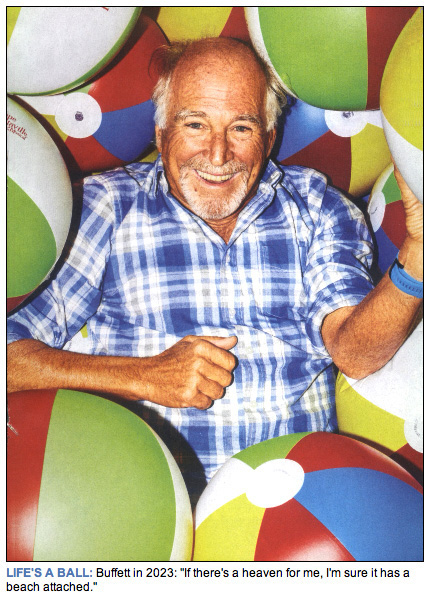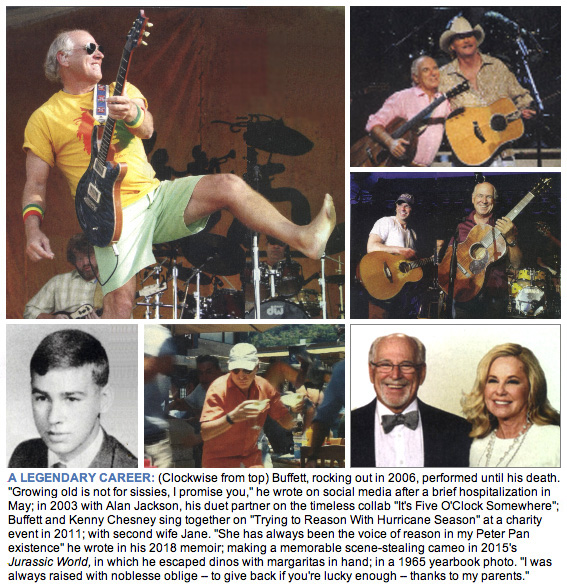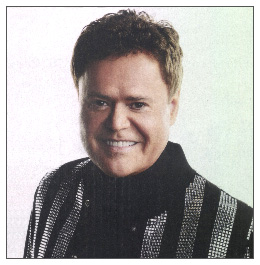![]()
| Jimmy Buffett, 1946-2023 |
|
![]()
The laid-back entertainer and businessman "lived his life like a song."
By Linda Marx and Jeff Nelson in People

![]() immy Buffett found peace in life's simple pleasures throughout his more-than-50-year music career -- and in a cancer diagnosis in his final years. Hits like "Margaritaville" cemented Buffett as the poster child for the easy, breezy, laid-back island lifestyle. And the singer maintained his signature zest for life until he died of Merkel cell carcinoma on Sept. 1, four years after he was diagnosed with the aggressive form of skin cancer. Just weeks before his death the 76-year-old Buffett made a surprise appearance at a waterfront café in Rhode Island, where he sang six songs and told the venue's owner he felt "effing incredible," according to local paper The Providence Journal. The musician's sense of humor also remained intact, says his sister Laurie Buffett McGuane, who joked and laughed with Buffett over childhood memories in his final days. "He was always high-spirited, fun-loving, hardworking and creative," adds Laurie's husband, writer Tom McGuane, a friend of Buffett's for more than 50 years. "It is remarkable to be able to say that he remained the same during the last month of his life." In a statement announcing Buffett's death, his family -- including wife Jane, 72, and their adult children, daughters Savannah and Sarah Delaney and son Cameron -- said "he lived his life like a song till the very last breath and will be missed beyond measure by so many."
immy Buffett found peace in life's simple pleasures throughout his more-than-50-year music career -- and in a cancer diagnosis in his final years. Hits like "Margaritaville" cemented Buffett as the poster child for the easy, breezy, laid-back island lifestyle. And the singer maintained his signature zest for life until he died of Merkel cell carcinoma on Sept. 1, four years after he was diagnosed with the aggressive form of skin cancer. Just weeks before his death the 76-year-old Buffett made a surprise appearance at a waterfront café in Rhode Island, where he sang six songs and told the venue's owner he felt "effing incredible," according to local paper The Providence Journal. The musician's sense of humor also remained intact, says his sister Laurie Buffett McGuane, who joked and laughed with Buffett over childhood memories in his final days. "He was always high-spirited, fun-loving, hardworking and creative," adds Laurie's husband, writer Tom McGuane, a friend of Buffett's for more than 50 years. "It is remarkable to be able to say that he remained the same during the last month of his life." In a statement announcing Buffett's death, his family -- including wife Jane, 72, and their adult children, daughters Savannah and Sarah Delaney and son Cameron -- said "he lived his life like a song till the very last breath and will be missed beyond measure by so many."
In the decades following his breakthrough success with 1977's "Margaritaville," Buffett continued to release albums (Equal Strain on All Parts, his 32nd, was slated for later this year). In recent years he notched No. 1 country songs celebrating the simple things in life with pal Alan Jackson ("It's Five O'Clock Somewhere") and Zac Brown Band ("Knee Deep"). But it was his business acumen that made Buffett, as his biographer Hiassen describes him, "larger than life." After decades in music Buffett became a billionaire by building his biggest hit into a lucrative empire of Margaritaville-themed restaurants, merchandise and more that catered to his devoted legion of "Parrothead" fans. Among them? Country star Kenny Chesney, who praised the late Buffett as having "taught a lot of people about the poetry in just living."
Buffett was inspired to expand into the restaurant business after he noticed that the now-defunct chain Chi-Chi's had copyrighted "Margaritaville" and a woman in Hawaii had done the same to "Cheeseburger in Paradise." "I was being ripped off everywhere because I wasn't paying attention," he told The Washington Post in 1998. "There was a demand there, and everyone was exploiting it but me! So I started taking care of business." Still, he didn't overthink his growing fortune. "I wish I could say that some secret plan for world domination was devised years ago, but I don't have a clue as to why, when or how all this happened," he told People in 1994. "I'm not going to dissect it. It'd ruin all the fun of being in the middle of it."
Buffett founded the first Margaritaville restaurant in Key West in 1985, and before long, business was booming, with fans flocking to live out their vacation fantasies in real life. Today Margaritaville Holdings has licensed nearly 150 restaurants, 30 resorts, cruises, apparel and more. "Listen," Buffett (who owned 28 percent of the company, according to Forbes) told The Washington Post in 1998, "I'm not about to apologize for being a good businessman. Too many people in music have ruined their lives because they weren't."
 Though he's all but synonymous with the Florida Keys, Buffett was born some 1,000 miles away in Pascagoula, Miss., on Christmas Day 1946. His dad, James, and his mom, Mary, later moved the family to Mobile, Ala., where they both worked in a shipyard. Buffett's grandfather would regale him with "tales from the high seas and far-off worlds that ignited my imagination," Buffett wrote in his 1998 memoir A Pirate Looks at Fifty. He earned a history degree from the University of Southern Mississippi in 1969 -- and it was at school that a fraternity brother inspired him to take up music. "I'm really a simple Catholic altar boy who wanted to play bass in a band to meet chicks," he told 60 Minutes in 1997. "I didn't want to be a frontman." A brief stint as a Nashville-based reporter for Billboard magazine clued him in on the ins and outs of the music business, and in 1970 he released his debut album, Down to Earth. The record flopped -- but following a divorce from his first wife Margie Washichek and a move to Key West, Fla., Buffett finally found success in 1977 with "Margaritaville," a hit off his album Changes in Latitudes, Changes in Attitudes that epitomized his trademark blend of folk, country, rock and Caribbean music. The enduring anthem, which was inducted into the Grammy Hall of Fame in 2016, was written by Buffett after a morning spent nursing a hangover with Mexican food and margaritas in Austin. "Never in my wildest dreams did I think it'd do what it did," he told 60 Minutes of the song. In 2018 he told Entertainment Weekly, "I'm a stream-of-consciousness writer. You write [in] moment, and you jot something down. 'Margaritaville' was written five minutes after I was having [a] margarita at a bar.... You never know what's going to work." The song remains Buffett's only Billboard Top 10 hit, but its island vibes buoyed his legendary brand. As he summed it up to 60 Minutes, "I sell escapism."
Though he's all but synonymous with the Florida Keys, Buffett was born some 1,000 miles away in Pascagoula, Miss., on Christmas Day 1946. His dad, James, and his mom, Mary, later moved the family to Mobile, Ala., where they both worked in a shipyard. Buffett's grandfather would regale him with "tales from the high seas and far-off worlds that ignited my imagination," Buffett wrote in his 1998 memoir A Pirate Looks at Fifty. He earned a history degree from the University of Southern Mississippi in 1969 -- and it was at school that a fraternity brother inspired him to take up music. "I'm really a simple Catholic altar boy who wanted to play bass in a band to meet chicks," he told 60 Minutes in 1997. "I didn't want to be a frontman." A brief stint as a Nashville-based reporter for Billboard magazine clued him in on the ins and outs of the music business, and in 1970 he released his debut album, Down to Earth. The record flopped -- but following a divorce from his first wife Margie Washichek and a move to Key West, Fla., Buffett finally found success in 1977 with "Margaritaville," a hit off his album Changes in Latitudes, Changes in Attitudes that epitomized his trademark blend of folk, country, rock and Caribbean music. The enduring anthem, which was inducted into the Grammy Hall of Fame in 2016, was written by Buffett after a morning spent nursing a hangover with Mexican food and margaritas in Austin. "Never in my wildest dreams did I think it'd do what it did," he told 60 Minutes of the song. In 2018 he told Entertainment Weekly, "I'm a stream-of-consciousness writer. You write [in] moment, and you jot something down. 'Margaritaville' was written five minutes after I was having [a] margarita at a bar.... You never know what's going to work." The song remains Buffett's only Billboard Top 10 hit, but its island vibes buoyed his legendary brand. As he summed it up to 60 Minutes, "I sell escapism."
Business aside, Buffett remained a major concert draw, with Forbes estimating that the shows he played each year with his Coral Reefer Band helped the star rake in $570 million. "I got into this business to have a good time, and if I wasn't still having fun, I'd get out, money or no money," he told the Post in 1998. "I never expected to tour this long. People say, 'Don't you get tired of doing all those songs like "Fins" and "Margaritaville" over and over?' And I look at them like they're crazy. They don't know what it's like to get up onstage each night and have 15,000 people yelling that they love you."
Offstage Buffett was a philanthropist and avid pilot whose midair near-death experiences twice made headlines. In 1994 he swam to safety after his seaplane crashed in the waters off Nantucket, Mass.; two years later police in Jamaica opened fire on his aircraft, mistaking Buffett and his fellow passengers (including U2 rocker Bono) for smugglers and inspiring his song "Jamaica Mistaica." Buffett married second wife Jane in 1977 and, as she told Time in 1998, relished the tranquility of domesticity, where he could make his kids pancakes and drive them to school. "That's the life he loves," she said. In Pirate, Buffett praised family and friends as "treasure more valuable than gold" and said he felt as though his own kind of paradise was at home. "I have been called a lot of things," he wrote, "but the thing I believe I am the most is lucky."
Even amid his health ordeal, Buffett remained grateful -- and committed to his family. His sister Laurie was diagnosed with pancreatic cancer shortly after his own diagnosis. "When Jimmy found out, he brought the whole family to be with me," says Laurie, who is now cancer-free. In his last days "we would repeat stories, and Jimmy would laugh and nod his head to let us know that he remembered," she adds. "I have never seen Jimmy depressed, ever -- not even at the end." Through it all Buffett saw the afterlife as just another adventure. "If there is a heaven for me," he wrote in his memoir, "I am sure that it has a beach attached to it." ![]()

| A Chat With Donny Osmond |
|
![]()
 The singer, 65, just extended his residency
The singer, 65, just extended his residency
at Harrah's Las Vegas through May 2024.
By Julie Jordan in People
Last perfect day off
Today, I have a secret garden. It's my oasis. I've got my little vineyard, an orchard. I just went out there and had myself a handful of raspberries and came in and called you.
Last thing I learned about myself
I've learned how to balance my life. I've been a workaholic, but I scheduled nothing so I could take my wife [Debbie], my children and our 14 grandkids all on a boating trip. I am Grandpa this weekend.
Last game I played
I play Sudoku daily on my phone. I only do hard and evil, never medium. I'm a sponge for learning.
Last thing I do before I go onstage
I say a prayer. I always remember one show where my brothers and I ran out onstage, and there were two people in the audience. So every time I see a packed house, I have an attitude of gratitude.
Last time I cursed
Never. Because I never heard my father curse. He was tough, but he never swore. Obviously I still think the words. There are certain people I would love to say certain words to at certain times, but I just think, "Be like your dad." ![]()
![]() Reader's Comments
Reader's Comments
No comments so far, be the first to comment.
